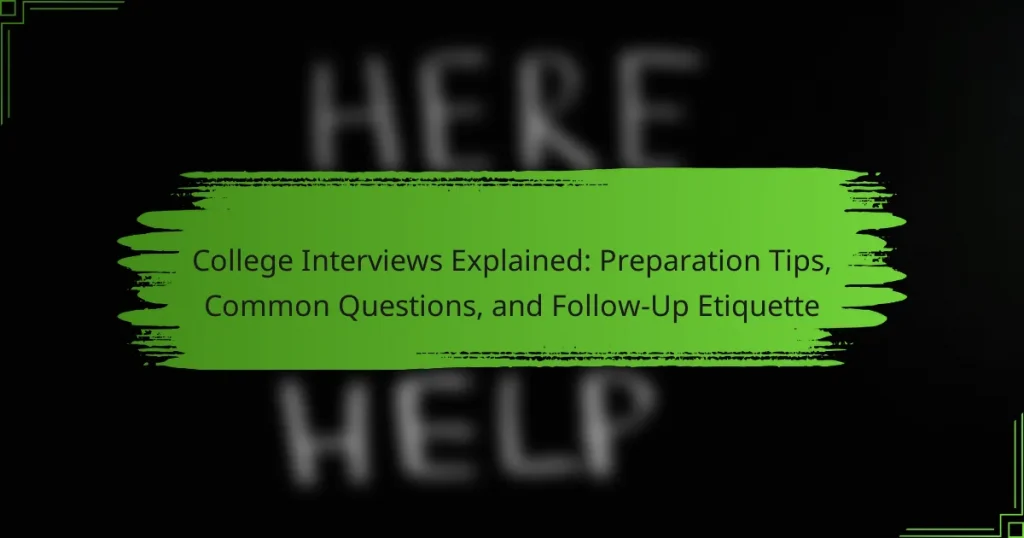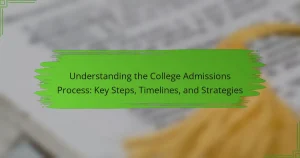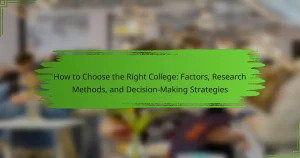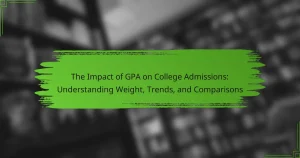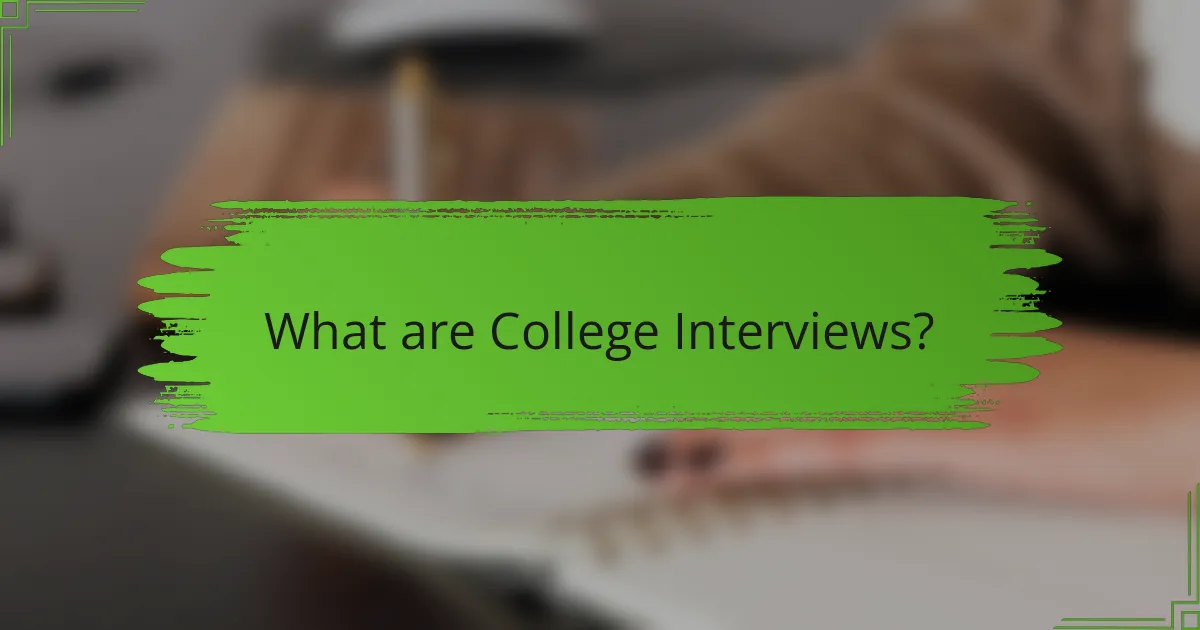
What are College Interviews?
College interviews are formal discussions between prospective students and college representatives. They serve to assess the applicant’s fit for the institution. These interviews often take place after submitting an application. Colleges use them to evaluate a candidate’s interests, goals, and personality. Interviews can be conducted in person, over the phone, or via video conferencing. They provide an opportunity for students to ask questions about the college. Additionally, interviews allow colleges to gauge the applicant’s communication skills. Research indicates that interviews can influence admission decisions, making them significant in the application process.
How do College Interviews differ from Job Interviews?
College interviews differ from job interviews primarily in their focus and purpose. College interviews assess a candidate’s fit for an academic environment. They often emphasize personal interests, motivations, and academic achievements. Job interviews, on the other hand, evaluate a candidate’s skills and experience relevant to a specific role. Employers prioritize work history and professional competencies in these interviews.
Moreover, college interviews may involve open-ended questions about future goals and passions. Job interviews typically include situational questions that gauge problem-solving abilities. The setting for college interviews is often less formal, fostering a conversational atmosphere. In contrast, job interviews can be more structured and formal.
Additionally, college interviews may take place with alumni or admissions staff. Job interviews usually involve hiring managers or HR representatives. Overall, the key differences lie in the focus on personal development for college versus professional qualifications for jobs.
What is the purpose of a college interview?
The purpose of a college interview is to assess the applicant’s fit for the institution. It allows colleges to evaluate a student’s personality, interests, and motivations. Interviews provide an opportunity for students to showcase their unique qualities. They also enable students to ask questions about the college. This interaction can help both parties determine compatibility. Many colleges use interviews as part of the admissions process. Statistics show that interviews can influence admission decisions positively. According to a study by the National Association for College Admission Counseling, interviews are valued by 60% of colleges in their selection process.
What types of college interviews exist?
There are several types of college interviews that students may encounter. The most common types include admissions interviews, informational interviews, and alumni interviews. Admissions interviews are typically conducted by college admissions staff to assess a candidate’s fit for the institution. Informational interviews allow prospective students to learn more about a college from current students or staff. Alumni interviews are conducted by former students who provide insights and evaluate candidates based on their experiences. Each type serves a distinct purpose in the college application process.
Why are College Interviews important for applicants?
College interviews are important for applicants because they provide a platform to showcase personality and fit. These interviews allow candidates to demonstrate their communication skills and enthusiasm for the institution. Additionally, interviews help colleges assess an applicant’s unique attributes beyond academic records. According to a study by the National Association for College Admission Counseling, 73% of admissions officers consider interviews as a valuable factor in their decision-making process. This indicates that interviews can significantly influence the outcome of an application. Moreover, they offer applicants a chance to ask questions and learn more about the college culture. Overall, college interviews play a crucial role in the admissions process.
How can a college interview impact admission decisions?
A college interview can significantly influence admission decisions. It allows applicants to showcase their personality and interests beyond their application. Admissions officers assess communication skills and fit for the college culture during the interview. A positive impression can enhance an applicant’s chances of acceptance. Conversely, a poor interview may raise concerns about an applicant’s suitability. According to a survey by the National Association for College Admission Counseling, 23% of colleges consider interviews as a very important factor in their decision-making process. Thus, performing well in an interview can be a decisive element in gaining admission.
What skills can be demonstrated during a college interview?
During a college interview, candidates can demonstrate communication skills. Effective verbal communication conveys ideas clearly and confidently. Non-verbal communication, such as body language, also plays a crucial role. Candidates can showcase critical thinking by responding thoughtfully to questions. Problem-solving skills can be highlighted through discussions about past experiences. Adaptability is shown when candidates adjust their responses based on the interviewer’s feedback. Additionally, teamwork skills can be illustrated by discussing collaborative projects. Lastly, enthusiasm for the college can reflect a candidate’s motivation and commitment.
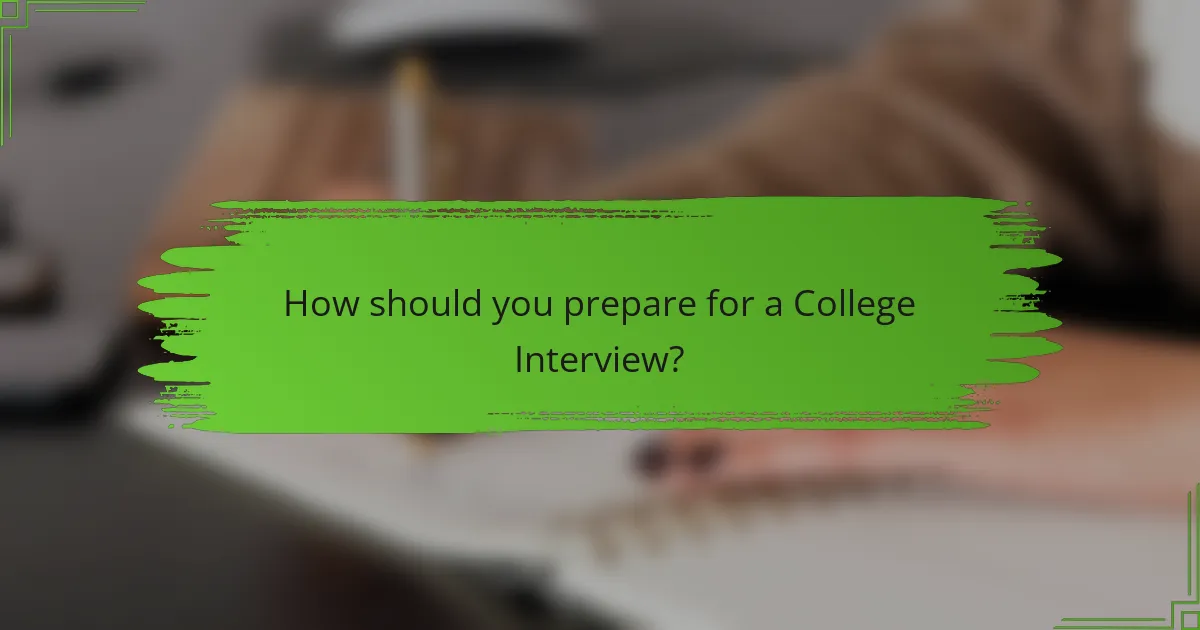
How should you prepare for a College Interview?
To prepare for a college interview, research the institution and its programs thoroughly. Understand the college’s values and mission statement. Review common interview questions and practice your responses. Prepare questions to ask the interviewer to demonstrate your interest. Dress appropriately to make a good first impression. Arrange a quiet, distraction-free environment if the interview is virtual. Arrive early to show punctuality and respect for the interviewer’s time. Follow up with a thank-you note to express gratitude for the opportunity.
What research should be done before the interview?
Research on the college and its programs is essential before the interview. Understand the college’s mission, values, and culture. Familiarize yourself with specific programs or majors of interest. Review recent news or achievements related to the college. Research faculty members and their areas of expertise. Prepare questions that reflect your knowledge about the college. This preparation demonstrates genuine interest and engagement. It also helps to align your goals with the college’s offerings.
How can understanding the college’s values help in preparation?
Understanding the college’s values aids in preparation by aligning personal goals with institutional priorities. This alignment allows candidates to tailor their responses during interviews. For instance, if a college values community service, applicants can highlight relevant volunteer experiences. Additionally, understanding these values helps candidates formulate questions that demonstrate genuine interest. Research shows that candidates who connect their experiences to a college’s mission are more memorable. This connection can significantly influence the interviewer’s perception.
What specific programs or faculty should be researched?
Research specific programs such as Business Administration, Computer Science, and Nursing. These fields are popular and have robust career prospects. Investigate faculty members with research interests aligned with your goals. Faculty expertise can significantly influence your educational experience. Look for faculty who have published in reputable journals or have industry experience. Programs with strong internship opportunities also enhance employability. Additionally, consider programs that offer mentorship or networking opportunities. These factors contribute to a well-rounded education and career readiness.
What practical steps should be taken to prepare?
Research the college and its programs. Understand the institution’s values and offerings. Review common interview questions. Prepare thoughtful responses that highlight your strengths. Practice your answers with a friend or mentor. Dress appropriately for the interview setting. Bring necessary documents, such as your resume and application materials. Arrive early to allow time for unforeseen delays. These steps enhance your confidence and readiness for the interview.
How can you practice common interview questions?
You can practice common interview questions by conducting mock interviews. Mock interviews simulate the interview environment and provide real-time feedback. They help you refine your responses and improve your confidence. You can ask a friend or family member to conduct these sessions. Alternatively, you can use online platforms that offer mock interview services. Research shows that practicing with a partner increases preparedness and reduces anxiety. Engaging in this practice allows you to identify areas for improvement. This method is widely recommended by career coaches and educational institutions.
What role does attire play in interview preparation?
Attire plays a crucial role in interview preparation. It significantly influences first impressions. A professional appearance can convey competence and confidence. Studies show that interviewers often make judgments within seconds based on attire. Dressing appropriately aligns with the company’s culture and values. For instance, formal attire is expected in corporate settings, while business casual may be suitable for creative industries. Moreover, appropriate attire can boost the candidate’s self-esteem. Feeling well-dressed can enhance performance during the interview. Overall, attire is an essential factor in presenting oneself positively to potential employers.
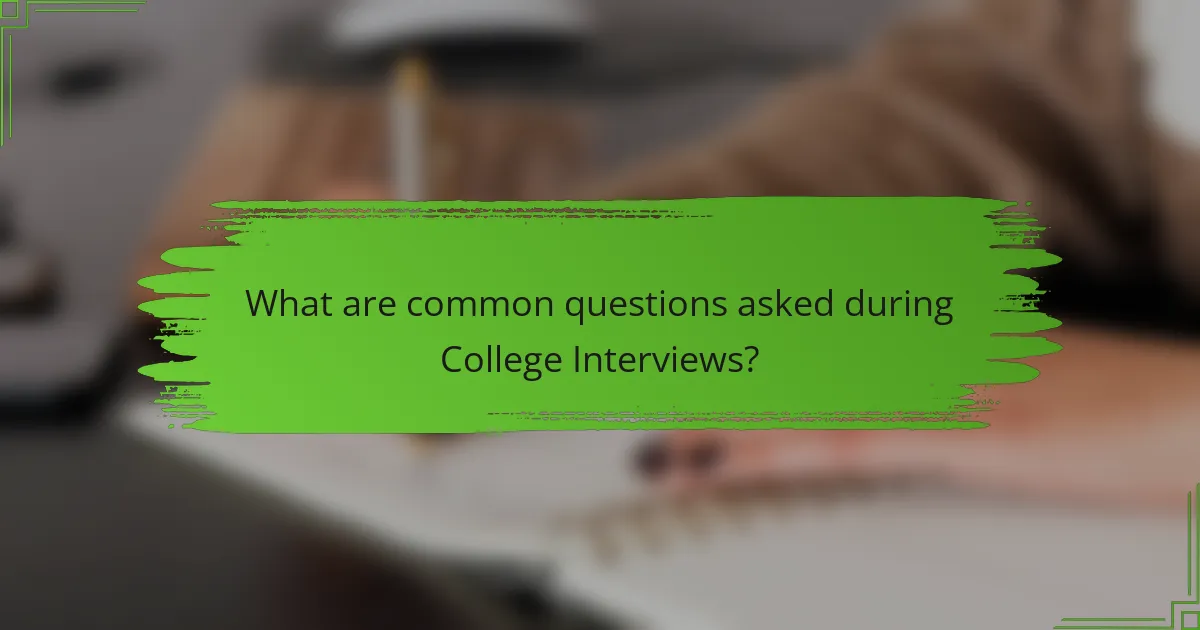
What are common questions asked during College Interviews?
Common questions asked during college interviews include inquiries about the applicant’s interests, motivations, and experiences. Interviewers often ask, “Why do you want to attend this college?” This question assesses the applicant’s fit and enthusiasm for the institution. Another frequent question is, “What are your academic interests?” This helps interviewers gauge the applicant’s focus and passion.
Applicants may also be asked about extracurricular activities, such as, “What do you do in your free time?” This question reveals the applicant’s personality and engagement outside academics. Additionally, interviewers might ask, “What challenges have you faced and how did you overcome them?” This assesses resilience and problem-solving skills.
Finally, questions like, “Where do you see yourself in five years?” evaluate the applicant’s long-term goals and aspirations. These questions are designed to provide a comprehensive view of the applicant’s character and potential fit within the college community.
What types of questions can you expect?
You can expect various types of questions during college interviews. These typically include personal questions, academic questions, and situational questions. Personal questions often explore your background, interests, and motivations. Academic questions may focus on your favorite subjects, achievements, and future goals. Situational questions assess how you would handle specific scenarios or challenges. Understanding these categories helps in preparing effectively. Research indicates that being aware of common question types can increase interview confidence and performance.
How do behavioral questions differ from traditional questions?
Behavioral questions differ from traditional questions in their focus on past experiences. Traditional questions often ask for hypothetical responses or opinions. In contrast, behavioral questions require candidates to provide specific examples of how they handled situations in the past. This approach helps interviewers assess a candidate’s skills and behaviors in real-world contexts. Research shows that behavioral interviewing is more predictive of future job performance. According to a study by the Society for Human Resource Management, candidates’ past behaviors are strong indicators of future actions.
What are some examples of common college interview questions?
Common college interview questions include inquiries about personal interests and motivations. Examples are “Tell me about yourself,” “Why do you want to attend this college?” and “What are your strengths and weaknesses?” Interviewers may also ask about extracurricular activities and future goals. Questions like “How do you handle challenges?” and “Describe a significant achievement.” These questions help assess a candidate’s fit for the college. They also gauge communication skills and self-awareness.
How should you respond to difficult questions?
Respond to difficult questions with clarity and composure. First, take a moment to gather your thoughts. This pause shows you are considering your response seriously. Next, answer honestly and directly. If you don’t know the answer, it’s acceptable to admit it. You can offer to follow up later with more information. Use examples from your experiences to illustrate your points. This adds credibility to your response. Maintain a calm demeanor throughout the conversation. This helps to convey confidence. A study by the University of California indicates that clarity in communication enhances understanding during interviews.
What strategies can help in answering unexpected questions?
Practicing active listening is essential for answering unexpected questions. This strategy allows individuals to fully understand the question before responding. Pausing before answering gives time to think and formulate a coherent response. Asking for clarification can help ensure that the question is understood correctly. Structuring responses using the STAR method (Situation, Task, Action, Result) can provide a clear and organized answer. Additionally, staying calm and composed helps maintain confidence during unexpected inquiries. Reflecting on past experiences can also prepare individuals for similar questions in the future. These strategies enhance the ability to respond effectively in high-pressure situations.
How can you turn weaknesses into strengths in your responses?
Identify your weaknesses honestly. Acknowledge them during responses. Frame these weaknesses as areas for growth. Highlight steps taken to improve on these weaknesses. Use specific examples to illustrate progress. This approach demonstrates self-awareness and resilience. Research indicates that employers value candidates who show adaptability. Presenting weaknesses in this manner can make you more relatable. This strategy can enhance your overall impression in college interviews.
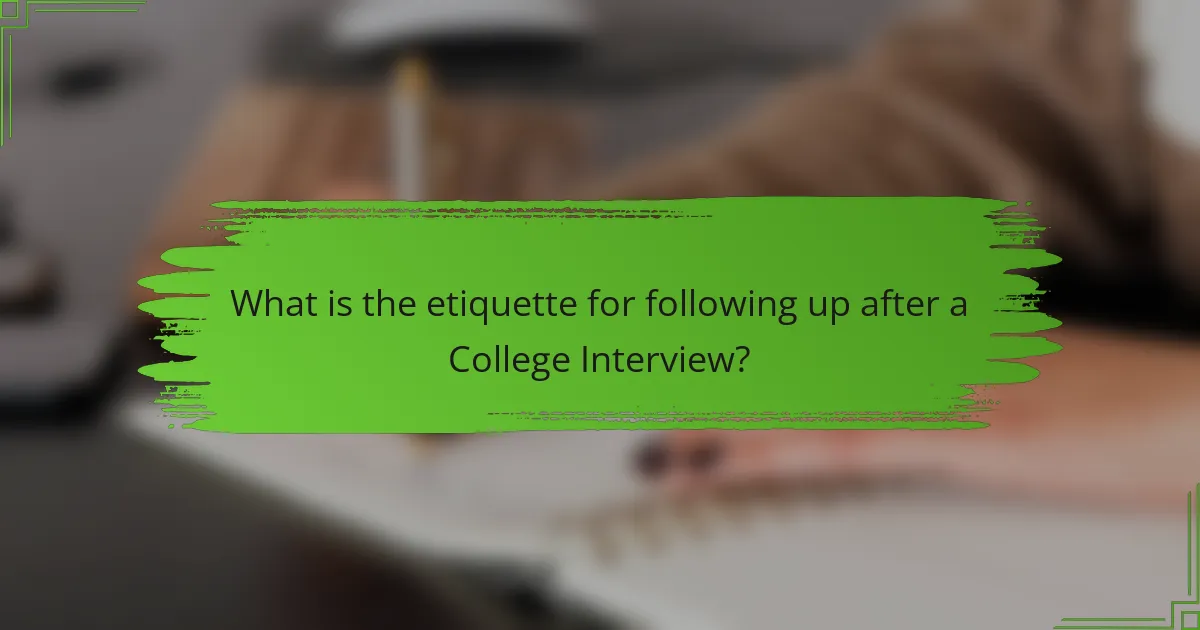
What is the etiquette for following up after a College Interview?
The etiquette for following up after a college interview involves sending a thank-you note. This note should be sent within 24 to 48 hours after the interview. It is important to express gratitude for the opportunity to interview. Mention specific topics discussed during the interview to personalize the note. A concise, professional tone is essential. Avoid overly casual language or excessive length. This follow-up reinforces your interest in the institution. According to a survey by the National Association of Colleges and Employers, 80% of employers appreciate thank-you notes. This practice can positively impact your application.
Why is it important to send a thank-you note?
Sending a thank-you note is important because it expresses gratitude and reinforces a positive impression. A thank-you note acknowledges the time and effort the interviewer invested in the meeting. It demonstrates professionalism and courtesy, which are valued traits in college candidates. Research indicates that candidates who send thank-you notes are remembered more favorably by interviewers. According to a study by the National Association of Colleges and Employers, 83% of employers appreciate receiving thank-you notes from candidates. This simple gesture can enhance the likelihood of being considered for admission or future opportunities.
What should be included in a thank-you note?
A thank-you note should include a specific expression of gratitude. Start with a greeting that addresses the recipient. Clearly state what you are thankful for, such as their time or insights. Mention a specific detail from your interaction to personalize the note. Express your continued interest in the opportunity or relationship. Close with a polite sign-off. This structure ensures clarity and sincerity in your message.
When is the best time to send a follow-up message?
The best time to send a follow-up message is within 24 to 48 hours after the interview. This timeframe shows promptness and appreciation for the interviewer’s time. Sending a message too late may diminish its impact. A timely follow-up reinforces your interest in the position. It also allows you to address any points discussed during the interview. Research indicates that candidates who follow up quickly are often viewed more favorably. This practice can enhance your chances of making a positive impression.
How can you maintain communication with the college after the interview?
To maintain communication with the college after the interview, send a thank-you email. A thank-you email should be sent within 24 to 48 hours after the interview. This email expresses gratitude for the opportunity and reinforces your interest in the college. Additionally, you can ask any follow-up questions you may have. It is also beneficial to connect on professional networks like LinkedIn. Engaging with the college’s social media can keep you updated on events and announcements. Lastly, consider reaching out periodically with updates on your achievements or interests. This approach keeps the communication line open and shows your ongoing interest in the college.
What are appropriate ways to stay in touch with admissions officers?
Appropriate ways to stay in touch with admissions officers include sending emails, attending college fairs, and participating in information sessions. Emails should be concise and respectful, expressing gratitude for their assistance. College fairs provide an opportunity for direct interaction and questions. Information sessions allow prospective students to engage and gather insights. Following up after these events with a thank-you note reinforces interest. Regular communication should be professional and relevant to the admissions process. Maintaining a respectful tone is crucial to foster a positive relationship.
How can you express continued interest in the college?
You can express continued interest in the college by sending a follow-up email. In this email, thank the admissions officer for their time during your interview. Mention specific aspects of the college that resonate with you, such as programs or campus culture. Additionally, share any recent achievements or updates since your interview. This shows your ongoing engagement and enthusiasm. Research indicates that personalized communication can positively impact admissions decisions. Studies have shown that applicants who demonstrate interest are often viewed more favorably by admissions committees.
What are the best practices for a successful College Interview experience?
Research shows that preparation is key for a successful college interview. Start by researching the college’s values and programs. This helps you align your answers with what the institution prioritizes. Practice common interview questions to improve your confidence. Mock interviews with friends or family can provide valuable feedback. Dress appropriately to make a positive first impression. Arriving early demonstrates punctuality and respect for the interviewer’s time. Prepare thoughtful questions to ask the interviewer, showing your genuine interest. Finally, send a thank-you note afterward to express appreciation for the opportunity. These practices collectively enhance your chances of making a strong impression during the interview.
What mindset should you adopt before the interview?
Adopt a confident and positive mindset before the interview. Confidence helps you communicate effectively and present your qualifications. A positive attitude demonstrates enthusiasm and a willingness to engage. Research shows that non-verbal cues, like body language, impact first impressions significantly. According to a study by UCLA, 55% of communication is non-verbal. Preparing thoroughly can also enhance your confidence. Familiarity with common interview questions can reduce anxiety. Visualizing success can further boost your mindset. Embracing a growth mindset allows you to view challenges as opportunities.
How can you ensure you leave a positive impression?
To ensure you leave a positive impression during a college interview, focus on your communication skills and body language. Speak clearly and confidently to convey your thoughts effectively. Maintain eye contact to show engagement and interest. Smile genuinely to create a welcoming atmosphere. Dress appropriately to reflect professionalism and seriousness about the opportunity. Research the college beforehand to demonstrate knowledge and enthusiasm. Prepare thoughtful questions to ask the interviewer, showing your interest in the institution. Follow up with a thank-you note to express appreciation for the opportunity. These actions collectively contribute to a favorable impression.
College interviews are formal discussions between prospective students and college representatives aimed at assessing the applicant’s fit for the institution. This article provides a comprehensive overview of college interviews, including their purpose, types, and differences from job interviews. Key topics include preparation strategies, common questions, effective responses to difficult inquiries, and follow-up etiquette. Additionally, the article emphasizes the importance of showcasing unique attributes and maintaining communication with admissions officers to enhance the chances of acceptance.
